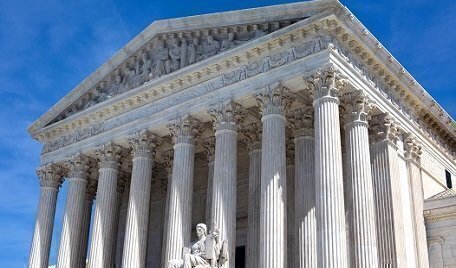In Supreme Court arguments on Wednesday, the nine Justices will tackle a Sixth Amendment question about the proper role of attorneys in capital murder cases when a lawyer admits guilt over his client’s objections.
 In McCoy v. Louisiana, Robert McCoy originally filed his own appeal directly to the Supreme Court about two questions related to his conviction on three murder charges. McCoy was sentenced to death in the case.
In McCoy v. Louisiana, Robert McCoy originally filed his own appeal directly to the Supreme Court about two questions related to his conviction on three murder charges. McCoy was sentenced to death in the case.
The Supreme Court accepted his appeal of a Louisiana state supreme court decision on one of the two questions: “Whether it is unconstitutional for defense counsel to concede an accused's guilt over the accused's express objection.”
McCoy was accused of killing three people in 2008 in a dispute with his then-wife and he was arrested after fleeing to Idaho. McCoy clashed with public defenders, briefly represented himself, and then hired an attorney, Larry English, to argue his case.
The client and his attorney disagreed about McCoy’s defense strategy, and English told the court he had doubts about McCoy’s competency due to “severe mental and emotional issues.” The two clashed at a public hearing, but McCoy retained English as his attorney. But then McCoy tried to fire English as his trial started, claiming he had another lawyer or would represent himself. The court refused that request, lacking evidence of a second attorney and seeing the move as a delaying tactic.
During trial, English introduced a defense that conceded McCoy’s role in the killings as a tactic to avoid the death penalty, by stressing McCoy’s mental condition. Under testimony, McCoy insisted he wasn’t guilty and he was the victim of a conspiracy. The jury found McCoy guilty of three first-degree murder counts. The jury then recommended the death penalty.
The Louisiana Supreme Court upheld the convictions and disagreed that the trial process violated McCoy’s rights to counsel and self-representation under the Sixth amendment. It found that English acted ethically under the conditions of the trial, citing Florida v. Nixon, a 2004 Supreme Court decision. There, a unanimous Court said that a lawyer could concede guilt in a murder case over a client’s objections under certain circumstances. “When counsel informs the defendant of the strategy counsel believes to be in the defendant’s best interest and the defendant is unresponsive, counsel’s strategic choice is not impeded by any blanket rule demanding the defendant’s explicit consent,” said Justice Ruth Bader Ginsburg.
McCoy’s appeal, under the supervision of attorney Seth Waxman, argues this case presents different circumstances. “The Sixth Amendment guarantees the accused both the right to an attorney and the right to decide whether to admit guilt. Louisiana posits that a defendant must forgo one of those rights as the price of exercising the other. But that claim flies in the face of the Framers’—and this Court’s—understanding that the defense belongs to the accused personally and that the accused is entitled to decide what the objectives of that defense should be,” he argues.
Among those submitting briefs supporting McCoy was The Criminal Bar Association Of England & Wales, which agrees with McCoy’s objections on originalist grounds rooted in English law. “It is the defendant, not his counsel, who selects his defense, and counsel is duty-bound to carry it through,” it claims.
The state of Louisiana argues that English would have violated the ethical standards for attorneys if he didn’t pursue a guilt-concession strategy, based on McCoy’s state of mind and the late timing of his objections to council. “In the rare case—such as this one—where only a concession strategy might spare the defendant’s life, the Sixth Amendment does not categorically bar its use over the defendant’s objection,” the state said in a response to McCoy’s petition.
The state also said English knew an alibi defense proposed by McCoy was implausible. “Had McCoy not demanded a specific alibi defense that English believed to be unethical and illegal and insisted upon personally testifying to the alibi, but only requested that his innocence be maintained, the case before this Court might be very different,” it concluded.
Scott Bomboy is the editor in chief of the National Constitution Center.







